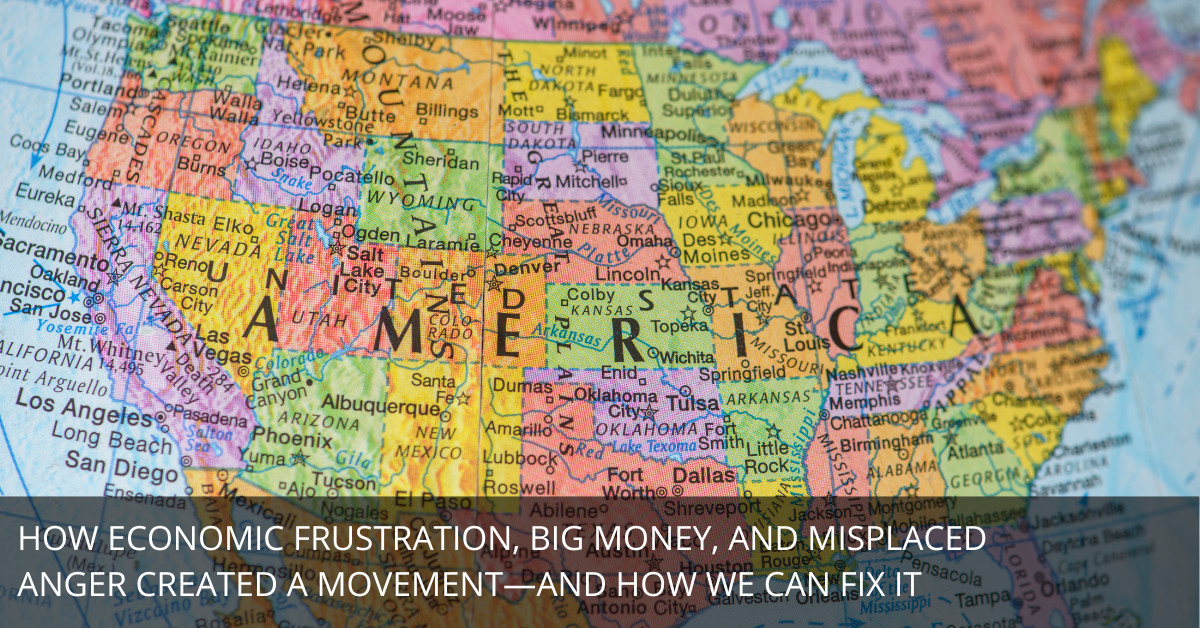
When I talk about "Trumpism," I'm not just talking about one man or his policies.
I'm talking about a deep, festering wound in America—one that's been ignored for too long. And if you’re serious about addressing it, you’ve got to get to the root of the problem.
This isn’t just about politics. It’s about people—people who’ve been struggling, frustrated, and, frankly, betrayed by a system that’s been rigged against them. And whether you’re a musician, a teacher, or a small business owner like me, you’ve felt this too.
So, let’s break it down and get to work on what really matters: fixing the problem.
The System is Rigged (and Everyone Knows It)
Let’s start with a truth bomb: The American Dream feels more like a cruel joke to millions of people.
Wages haven’t kept up with inflation. Job security is a thing of the past. Meanwhile, CEO salaries have skyrocketed, housing costs are insane, and healthcare? Don’t even get me started.
Here’s the kicker: People across the political spectrum know this. Whether they’re sipping coffee in a union hall or nursing a beer in a rural diner, they’ll tell you the same thing: The system is rigged. And they’re not wrong.
Wall Street got bailed out after the 2008 crash. Regular folks didn’t. Politicians keep passing trade agreements that ship jobs overseas. And big corporations? They’re getting tax breaks while Main Street businesses are closing their doors.
Why Outsiders Like Trump and Sanders Got Traction
In 2016, people didn’t want the same old politicians. They wanted someone—anyone—who promised to shake things up.
That’s why Bernie Sanders and Donald Trump both resonated. Sanders tapped into anger about income inequality, Wall Street greed, and corporate power. Trump did something similar but took it in a different direction, pointing the finger at immigrants, minorities, and cultural issues.
Both appealed to blue-collar workers who were tired of feeling ignored and forgotten. The difference? Trump didn’t deliver. Instead, he doubled down on the same crony capitalism people were angry about.
So, What Do We Do About It?
This isn’t a spectator sport. If you want to root out Trumpism—or, more accurately, fix the underlying issues—it’s time to roll up your sleeves and act.
Here’s how you can start making a difference today:
1. Get Big Money Out of Politics
Ever wonder why nothing changes? Follow the money. Corporate donations and lobbying have turned our government into a playground for the rich.
Here’s what to do:
- Support legislation to overturn Citizens United. This Supreme Court decision opened the floodgates for unlimited corporate spending in elections.
- Push for public campaign financing. This would level the playing field so that everyday people—not just billionaires—can run for office.
- Demand transparency. Politicians should disclose every dollar they receive and from whom. No exceptions.
For example, you can join organizations like End Citizens United or call your representatives directly. Make noise.
2. Support Workers and Unions
Big corporations are running the show, and workers are paying the price. Stagnant wages and poor working conditions aren’t accidents—they’re features of a system designed to maximize profits at your expense.
Here’s what to do next:
- Advocate for stronger labor laws that protect the right to unionize. Unions are one of the few ways workers can fight back against corporate power.
- Buy from companies that treat workers fairly. Skip the big-box store and support local businesses whenever possible.
- Push for a living wage in your community. Get involved in campaigns that aim to raise the minimum wage to something people can actually live on.
Think about it this way: Every time you spend money, you vote for the world you want to live in.
3. Rebuild the Connection Between People and Politics
One reason Trumpism thrived is that so many people feel disconnected from politics. They think, Why bother? Nothing ever changes. And you know what? They’re not entirely wrong. But we can fix that.
Here’s how to reconnect people to the system:
- Host community discussions that focus on real solutions—not partisan talking points.
- Volunteer for campaigns or initiatives that emphasize economic reform.
- Use your voice. Write op-eds, share resources on social media, or start a blog about issues that matter to you.
For example, if you’re a musician, write a song that captures the struggles of the working class. Then, take a stand against Spotify’s stranglehold on music—because the Spotify CEO/musician pay gap makes me sick.
4. Demand Accountability from Leaders
Politicians are great at making promises, but delivering? That’s another story. It’s time to hold their feet to the fire.
Here are three steps to start:
- Track how your representatives vote. Sites like GovTrack make it easy to see whether they support policies that help or hurt working families.
- Organize locally. Petitions, protests, and phone calls may seem small, but they add up.
- Don’t settle for lip service. If a politician isn’t delivering, vote them out. Period.
Think of it like firing a bad employee. If someone isn’t doing their job, you replace them.
5. Educate Yourself and Others
Ignorance is Trumpism’s best friend. When people don’t know what’s really going on, it’s easier to distract them with scapegoats.
Here’s how to get smarter (and help others do the same):
- Read books that break down complex issues in plain English. Start with something like Winner-Take-All Politics by Jacob Hacker and Paul Pierson.
- Share what you learn. Whether it’s through social media, casual conversations, or community events, spread the word.
- Fact-check everything. Disinformation is rampant, so make sure your opinions are based on facts, not fearmongering.
For example, the next time someone tells you immigrants are stealing jobs, hit them with the data: Automation has taken far more jobs than immigration ever could.
The Bottom Line
Rooting out Trumpism isn’t about defeating one politician or winning one election. It’s about addressing the deep, systemic problems that got us here in the first place.
It’s about standing up to big money, supporting workers, reconnecting people to the political process, demanding accountability, and educating ourselves and others.
This isn’t easy work. But if we do it right, we can build a system that works for everyone—not just the wealthy and well-connected.
So, what’s your next move?

